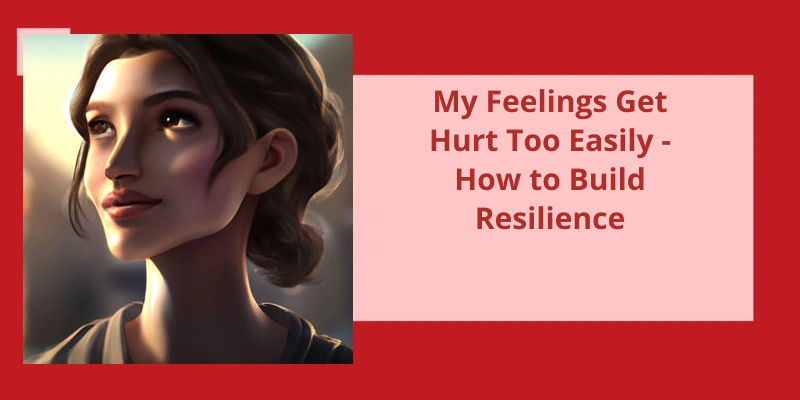As human beings, we all experience emotions in different ways and to varying intensities. For some of us, feelings of hurt can arise more easily than others. Whether it's due to past experiences, personality traits, or current life events, these emotions can be overwhelming and confusing. It can be challenging trying to navigate through our emotions and not let them completely consume us. However, it's important to acknowledge and understand these feelings in order to move forward and learn how to cope with them effectively.
How Do You Stop Getting Your Feelings Hurt So Easily?
Emotions are a natural part of being human, and at times, we all experience hurt feelings. However, some people may find themselves getting hurt too easily, which can impact their wellbeing and relationships. It’s important to understand that while we can’t control what happens to us, we can control how we react to it. We can learn to manage our emotions and deal with hurt feelings in a healthy way.
Firstly, it’s important to allow yourself to feel what you need to feel. Suppressing or ignoring your feelings can make things worse, so it’s important to acknowledge and accept your emotions. This can help you move towards healing and resolution.
Next, it’s important to find healthy ways to express your hurt. This could be talking to a friend, writing in a journal, or seeking professional help. It’s important to avoid negative coping mechanisms such as substance abuse or self-harm.
Questioning your hurt feelings can also be helpful. Sometimes our emotions are based on assumptions or perceptions that may not be accurate. It can be useful to challenge these beliefs and consider alternative perspectives.
Managing your behaviour is also important. Sometimes we may act out of hurt, which can cause further damage. It’s important to take a step back and consider the impact of our actions before reacting.
Trying new perspectives can also be helpful. This could involve considering the other persons perspective or thinking about the bigger picture. This can help us gain a broader understanding of the situation and reduce the impact of hurt feelings.
Balancing things out can also be helpful. Focusing solely on the negative aspects can amplify our hurt feelings. It can be useful to also consider positive experiences and aspects of the situation.
Focusing on wellbeing is crucial. Engaging in self-care activities such as exercise, relaxation techniques, or spending time in nature can boost our overall wellbeing and help us manage our emotions.
Finally, raising our self-compassion is important. Sometimes we can be too hard on ourselves, which can exacerbate our hurt feelings. Practicing self-compassion involves treating ourselves with kindness and understanding, just as we’d a close friend. This can help us reduce the impact of hurt feelings and move towards healing and resilience.
Emotional pain is a universal human experience that can be caused by a range of circumstances. It’s a deep-rooted feeling that can be difficult to shake, and it can manifest itself in a number of ways. If left unaddressed, emotional pain can have a debilitating effect on an individual’s overall well-being. In this article, we explore why emotional pain is so pervasive and the steps you can take to help alleviate it.
Why Am I So Hurt Emotionally?
Emotional pain is a complex experience that manifests itself in several ways. It’s more than just feeling sad or upset; emotional pain can also manifest as physical symptoms like headaches, gastrointestinal problems, or chronic pain.
Grief, for example, can be a source of intense emotional pain, whether it’s due to the loss of a loved one, a relationship, or a job. Trauma, childhood abuse, and other forms of mistreatment can also lead to emotional pain that can last for years. Toxic relationships, which can be characterized by verbal or physical abuse, can cause significant emotional distress.
Emotional wounds can be difficult to heal, as they can affect a persons mental and physical health. Depression, anxiety, and other mental illnesses can be caused or exacerbated by emotional pain. The longer that emotional pain is left untreated, the more likely it’s to become chronic, leading to other health problems.
Releasing emotional pain requires a lot of work. Seeking support is a significant step in healing. Talking to friends, family, or mental health professionals can be an excellent way to express and release emotions, relieve stress, and process traumas. Yoga, meditation, and other mindfulness practices can also be helpful in managing emotional distress, as they help to relax the body and calm the mind.
Lastly, healing from emotional pain requires self-compassion and patience. It’s essential to acknowledge the emotions and experiences that have caused pain and to learn healthy ways to cope with those feelings. Learning self-care practices and mindfulness techniques can help one learn how to feel their emotions without judging or repressing them, which leads to long-term healing and recovery.
Being emotionally sensitive can be a double-edged sword. On the one hand, it can make us more empathetic and compassionate towards others. On the other hand, it can also leave us feeling overwhelmed and easily triggered by our own emotions. If you’re looking for ways to rein in your sensitivity, there are a number of techniques you can try. Let’s take a closer look at a few of them.
How Do I Stop Being So Emotionally Sensitive?
One of the biggest challenges that many people face is being too emotionally sensitive. It’s something that can make everyday life a struggle, as little things can trigger big emotional responses. However, learning how to manage emotional sensitivity can help you live a more peaceful, productive life.
One approach is to build your emotional regulation skills. This involves understanding your own emotions and how to control them. One way to do this is by practicing deep breathing exercises or practicing progressive muscle relaxation. Through these techniques, you can learn to calm your mind and body, which can help reduce your emotional sensitivity.
Another way to become less emotionally sensitive is to practice mindfulness. Mindfulness involves being present in the moment and focusing on whats happening right now, rather than worrying about the future or dwelling on the past. Through mindfulness, you can learn to observe your emotions without being overwhelmed by them.
You can also try writing about your feelings in a journal. This can be a great way to release emotions and get a clearer understanding of whats going on inside your head and heart. Writing can also help you identify triggers and patterns in your emotional responses, which can help you better manage your sensitivity.
It’s easy to feel hurt by what others say or do, but often it’s nothing to do with you. Instead, try to remember that everyone has their own struggles and that you cant control what others say or do.
Additionally, accepting yourself for who you’re can also help reduce emotional sensitivity. When you’ve a strong sense of self-worth and self-esteem, youll be less likely to take criticism or rejection personally. Learning to accept your flaws and imperfections can help you develop a healthier perspective on life.
Finally, becoming better at tolerating distress can help with emotional sensitivity. Rather than running away from uncomfortable feelings, try to face them head-on. This means allowing yourself to feel sad, angry, or anxious without trying to avoid or suppress those emotions. Over time, youll become more resilient to emotional triggers and better at managing your sensitivity.
Identifying the Root Cause of Emotional Sensitivity
Emotional sensitivity can be caused by a variety of factors, such as past experiences, genetics, hormone imbalances, and other physical or emotional issues. Identifying the root cause of emotional sensitivity involves exploring these factors and working with a trained professional to develop strategies for managing and coping with emotions.
Learning how to not let people’s words and opinions hurt you can be a challenging task. However, it’s an important step towards building your own self-love and confidence. By remembering that it usually isn’t about you, acknowledging the individual meaning of words, and allowing yourself to feel your reactions, you can begin to dissect the wounds that may be causing you hurt. Additionally, speaking your truth and practicing daily self-love can further help you to move towards greater emotional resilience.
How Do I Stop Getting Hurt by Words?
Often times when someone says something hurtful, it isnt actually about you. The person may be projecting their own insecurities or frustrations onto you, or they simply may not have thought about how their words would affect you. It’s important to remember that their words don’t define you, and that you’ve the power to choose how you react to them.
Each of us has our own unique interpretation of words. One word may mean something positive to one person, while it may be offensive to another. It’s important to keep in mind that the way someone else interprets words may not be the same as you. By acknowledging this, you can detach yourself from the emotional impact of someone elses words.
Ultimately, words can only hurt you if you allow them to. It’s important to take ownership of your emotions and not give someone else the power to dictate how you feel. By consciously choosing not to let words affect you, you can take back control of your emotional well-being.
It’s okay to feel hurt or upset by someones words. Allow yourself to acknowledge and process those emotions, but don’t dwell on them. By simply allowing yourself to feel what you need to feel, you can move forward and let go of the hurt.
When someone says something hurtful, it’s not uncommon for old wounds to resurface. Take note of those wounds, and use them as an opportunity to work through those past traumas. By doing so, you can prevent those wounds from being triggered in the future.
When you feel hurt by someones words, it’s important to speak your truth. Let the other person know how their words affected you, and why. This not only helps you take ownership of your emotions, but it may also help the other person become more mindful of their own words in the future.
Sometimes, both parties may have wounds that need to be addressed. By putting both wounds on the dissection table, you can work together to find a resolution that benefits everyone involved.
Finally, daily self-love is key to developing a strong sense of emotional resilience. By prioritizing your own well-being, you can build a strong foundation of self-confidence and self-worth that can help protect you from the impact of someone elses words. Remember that your worth isn’t defined by anyone elses opinions or words, and that you deserve love and respect from yourself and from others.
Seeking Support From Friends or Professionals When Dealing With Emotional Pain Caused by Words
- Talking to a trusted friend
- Reaching out to a mental health professional
- Attending therapy sessions
- Joining a support group
- Engaging in self-care activities
- Using mindfulness and relaxation techniques
- Finding comfort in hobbies or interests
- Writing in a journal
- Limiting exposure to negative words or people
- Working on building self-esteem and self-acceptance
Source: 10 WAYS TO NOT LET PEOPLE’S WORDS AND OPINIONS …
Experiencing emotional pain can be a difficult and overwhelming experience. It’s important to take steps to address your emotions and find healthy coping mechanisms. In this article, we’ll discuss a few ways to cope with emotional pain, including spending time doing activities you enjoy, moving your body, taking control of your anxiety or depression, volunteering, journaling, and seeing a therapist. By taking care of yourself and your mental health, you can start to heal and move forward from your emotional pain.
How Do I Get Over Being Emotionally Hurt?
Emotional pain is a challenging aspect of life that can leave us feeling lost and hurt. The first step to getting over this kind of pain is to acknowledge that it exists. It’s important to note that you’re allowed to feel emotional pain and that it’s a natural part of life. Once youve accepted your pain, you can begin to look for ways to cope with it constructively.
Crying is also a healthy part of coping with emotional pain. It can be a helpful way to release pent up emotions and can leave you feeling lighter afterward. Holding in your emotions can only make the pain worse, so it’s important to allow yourself to feel vulnerable and cry when necessary.
Moving your body is another way to cope with emotional pain. Exercise can release endorphins, which are natural mood boosters. It also provides an outlet for emotional energy and can be a healthy way to let go of pent up emotions.
Taking control of anxiety and depression, which are common side effects of emotional pain, is another important step in getting over the hurt. This can include talking to a therapist, practicing mindfulness techniques, or seeking medical treatment if needed. Addressing underlying mental health concerns can help to alleviate the emotional pain you may be experiencing.
Volunteering is another way to get over emotional pain. Helping others can give you a sense of purpose and fulfillment, and can even help you gain perspective on your own problems. Giving back can be a powerful way to heal yourself and others.
Finally, writing down your emotions in a journal can be a helpful coping mechanism. Journaling provides a safe space for you to express your feelings and can help you gain insight into your emotions. It can also be a helpful tool for tracking your progress and identifying patterns in your behavior.
How to Identify and Process Different Types of Emotional Pain, Such as Grief, Rejection, or Betrayal
- Grief
- Rejection
- Betrayal
It’s common to experience emotional pain at some point in our lives. However, if it’s happening frequently, it’s important to understand the underlying reasons. While it could be due to external factors, there could be deeper issues at play. In this article, we’ll explore some potential reasons why you might be experiencing emotional hurt and provide tips on how to cope.
Why Do I Keep Getting Hurt Emotionally?
Whatever the cause, experiencing emotional pain can be incredibly challenging and can hinder our ability to move forward in life. So, why do we keep getting hurt emotionally?
One possible explanation is that we havent learned healthy coping mechanisms. If we didnt grow up in an environment that taught us how to process and deal with difficult emotions, we might find ourselves constantly struggling with emotional distress. In this case, therapy or counseling can be incredibly helpful in learning healthy coping mechanisms.
Another possibility is that were attracted to toxic relationships. Unfortunately, it’s not uncommon for people to find themselves in relationships with individuals who’re emotionally manipulative or abusive. In these situations, it can be incredibly difficult to break free without the help of a therapist or support group. It’s important to recognize the signs of a toxic relationship and be willing to seek help if needed.
Sometimes, our emotional pain can be the result of unresolved childhood trauma. This type of emotional distress can be especially challenging to deal with as it might be subconscious. In these cases, it’s important to work with a therapist who specializes in trauma therapy to help us process and heal from our past.
In some instances, our emotional pain might be a symptom of a larger mental health condition such as depression or anxiety. These conditions can impact every aspect of our lives, including our ability to process and deal with emotions. Seeking proper treatment from a mental health professional can help us manage our symptoms and learn healthy coping mechanisms.
Lastly, it’s important to recognize that sometimes we simply need time to heal. When we experience loss or grief, it’s natural to feel emotionally distressed for a period of time. It’s important to allow ourselves the space and time we need to process our emotions and heal. This might mean taking a break from social media or certain activities that trigger our emotions.
There are many reasons why we might find ourselves constantly experiencing emotional distress. The important thing is to recognize when we need help and be willing to seek it out. Whether it’s through therapy, support groups, or medication, there are resources available to help us manage our emotions and move forward in life.
Conclusion
However, it's important to remember that it's okay to feel hurt emotionally. The key is to try to understand why we’re feeling that way and take steps to address it. This could involve exploring our triggers, practicing self-care, and seeking support from loved ones or professionals. Ultimately, we should strive to be kinder and more compassionate towards ourselves and others, recognizing that we all have our own unique struggles and vulnerabilities. By doing so, we can create a more empathetic and understanding world where emotional sensitivity isn’t viewed as weakness, but rather as a valuable aspect of our humanity.






